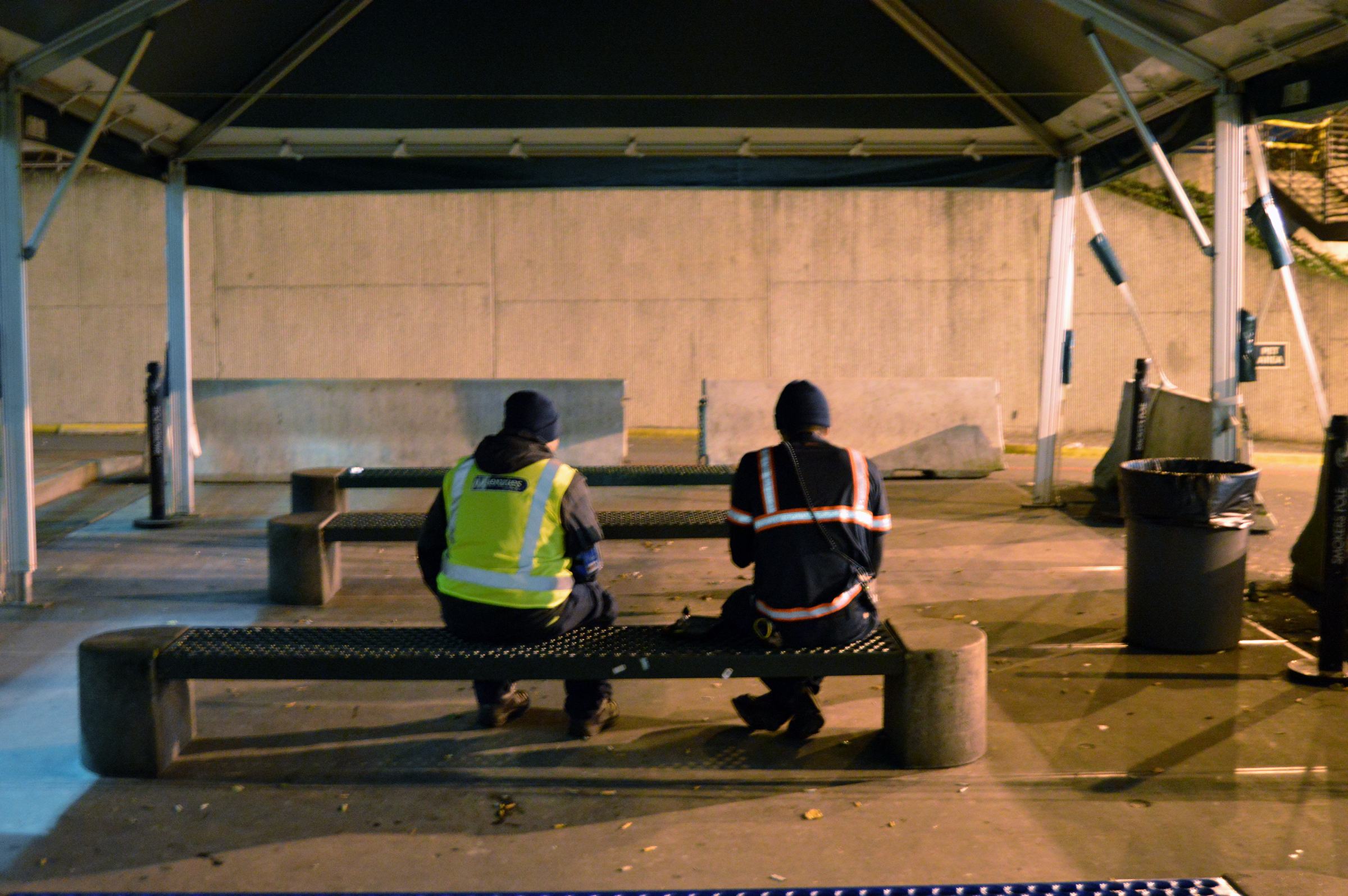The baggage handler stubbed out a cigarette and stood up before saying that the job, at least for him, isn’t all that bad. It’s laboring in the elements. Hauling luggage to and from planes regardless of whether temperatures are warm and conducive for outdoor work or, as they were Sunday night, hovering around 30 degrees with a breeze that slowly cuts through layers of clothing until it reaches your marrow.
Oversized ear protectors pushed the black knit Menzies Aviation hat low over his eyes, and he paused before looking out. “I think the management is kinda crappy,” he says. “Other than that, you know, the job is pretty solid.”
The baggage handler declined to give his name, worried that speaking about Menzies, the London-based contractor that employs him, could cost his job. As it is, the job allows him to spend consecutive days with his kids while earning decent money and avoiding the graveyard shift.
Workers like this one deserve more, say wage activists who have once again turned their attention to Sea-Tac International Airport.
Last month police arrested four people, including Seattle City Councilmember Kshama Sawant, during protests in front of the headquarters of Alaska Airlines, one of the carriers that uses Menzies. The roughly 100-person protest focused on Alaska in part because the airline donated more than $100,000 to a group opposed to a minimum-wage referendum that passed last year in SeaTac, and also because it’s the largest carrier at the airport, said Sage Wilson, spokesman for wage-advocacy group Working Washington. “They have the power to set the standard and raise the standard for everyone [at Sea-Tac],” Wilson says of Alaska Airlines, which accounts for about 40 percent of Sea-Tac flights.
Last year, voters in SeaTac, where the airport is located, approved the referendum to raise the minimum wage to $15. Alaska and others opposed to the referendum, called Proposition 1, filed a lawsuit soon after the vote. A King County judge ruled that the city of SeaTac couldn’t enforce a minimum wage at the airport, because it is operated by the Port of Seattle.
The ruling was appealed to the state Supreme Court. Arguments were made in June, and now both sides are waiting for a ruling, which could be handed down any Thursday now, says Dmitri Iglitzin, one of the attorneys who argued in favor of Proposition 1.
In the meantime, Alaska Airlines is receiving the brunt of public criticism aimed at airport businesses’ resistance to Prop 1.
Alaska is a familiar foe in the current wage battles. The airline’s role in the debate stretches back almost a decade, says Heather Weiner, spokeswoman for Yes! For SeaTac, the labor-supported group that worked in favor of Prop 1. It began when Alaska fired its baggage handlers in 2005—all 472 of them—after the airline and the baggage handlers’ union couldn’t come to terms on a new contract. Union workers were able to make more than $20 an hour with their previous contract; the one Alaska proposed capped wages at $15 an hour. When the union rejected that contract, Alaska immediately hired Menzies to provide contract workers at about $9 an hour. Union workers clocking in for their 3 a.m. shifts were told they had been replaced.
Labor is one of the biggest slices of Alaska’s costs, accounting for 42 percent of non-fuel expenses last year, financial documents show. And at the time of the lay-offs the Seattle Times reported that the move saved more than $13 million a year.
The Alaska employees who were replaced by contractors tried to negotiate with various contracting firms, demonstrated, and attempted to unionize the Menzies workers, recalls Weiner, who worked with the teamsters before joining the Yes! campaign last year. The companies resisted those efforts, claiming that the contract workers would have to be unionized nationally and all at once. Weiner recalled that the companies argued that a union in a single airport would violate the Constitution’s Commerce Clause.
The out-of-work handlers then directed their efforts at the Port of Seattle. When it became clear the Port wouldn’t act, Weiner says they tried unsuccessfully to introduce legislation in Olympia. Taking it directly to the voters, in the form of Prop 1, was the next step.
Since then, the Port commission voted this summer to bump minimum wages for airport employees to $11.22 an hour in 2015 and to $13 in 2017. Industry group Airlines for America—on whose board of directors sits Alaska president and CEO Bradley D. Tilden—sued the Port, claiming the wage increase conflicts with state and federal law and existing labor agreements.
Alaska did raise wages in April to $12 an hour for almost 1,000 workers at Sea-Tac and $10 for tipped workers, according to Alaska spokeswoman Bobbie Egan. She also notes that the airline donated $1.5 million to the nonprofit Port Jobs to expand its Airport University program.
“Alaska is constantly evaluating our vendor agreements and working to ensure fair and competitive compensation,” Egan wrote. “The wage increase for our vendor employees in April was the right thing to do at the time.”
For the activists, that’s still not enough.
“I think [Alaska] will continue to do this until their customers or their stockholders say enough is enough,” Weiner says.
Shareholders interested in returns are not likely to speak up. Alaska’s parent company raked in record profits of $508 million last year.
news@seattleweekly.com




